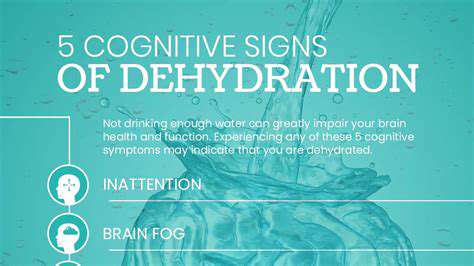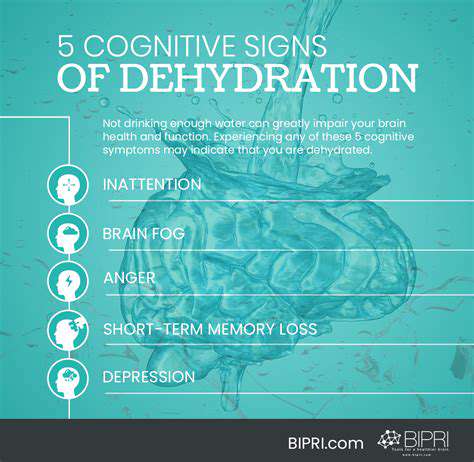
Dehydration's Influence on Chronic Pain Conditions

Dehydration and its Impact on Overall Health
Dehydration, a condition characterized by insufficient fluid intake, can significantly affect various aspects of health, impacting both short-term well-being and long-term health outcomes. It's a surprisingly common issue, often overlooked or underestimated in its severity.
The body relies on proper hydration for numerous functions, including nutrient transport, temperature regulation, and waste elimination. When deprived of adequate fluids, these processes can be compromised, leading to a cascade of potential health problems.
The Role of Dehydration in Chronic Conditions
Chronic conditions, by their very nature, often require careful management and vigilance. Dehydration can exacerbate existing symptoms and hinder the effectiveness of treatment plans.
Dehydration can impact the efficacy of medications, potentially leading to adverse reactions or reduced therapeutic benefits. Moreover, it can complicate the management of chronic pain, fatigue, and other symptoms associated with various illnesses.
Dehydration and Cardiovascular Health
The cardiovascular system is particularly sensitive to fluid imbalances. Dehydration can lead to increased blood viscosity, which can strain the heart and increase the risk of cardiovascular complications. Maintaining adequate hydration is crucial for optimal cardiovascular function.
Reduced blood volume due to dehydration can lead to decreased blood pressure, potentially triggering dizziness, lightheadedness, or even fainting spells. This is especially concerning for individuals with pre-existing heart conditions.
Dehydration and Kidney Function
The kidneys play a vital role in filtering waste products from the blood. Dehydration can strain the kidneys, reducing their ability to perform this essential function. This can lead to kidney damage over time, further impacting overall health.
Adequate hydration helps to maintain the proper flow of urine, promoting healthy kidney function. Neglecting hydration can put a significant strain on these vital organs, potentially leading to serious long-term consequences.
Dehydration and Digestive Health
The digestive system relies on proper hydration for optimal function. Dehydration can lead to constipation, abdominal cramps, and other digestive issues. Maintaining adequate fluid intake is crucial for regular bowel movements and overall digestive health.
Constipation, a common symptom of dehydration, can lead to discomfort and potentially more serious complications. By ensuring sufficient hydration, individuals can support a healthy digestive system and prevent these issues.
Dehydration and Cognitive Function
Dehydration can significantly impact cognitive function, affecting mood, concentration, and overall mental clarity. Mild dehydration can lead to reduced alertness and impaired cognitive performance.
Even mild dehydration can hinder cognitive performance, impacting productivity and daily tasks. It is essential to prioritize hydration for optimal mental function and overall well-being.
The Importance of Hydration for Optimal Brain Health

Hydration's Crucial Role in Optimal Performance
Staying adequately hydrated is paramount for optimal athletic performance and overall well-being. Proper hydration ensures that your body functions efficiently, enabling you to train harder and recover faster. Dehydration can significantly impair physical and cognitive performance, leading to reduced strength, endurance, and mental focus. This is especially true during prolonged exercise or in hot and humid environments.
Maintaining optimal hydration levels is essential for regulating body temperature, transporting nutrients, and removing waste products. Water plays a critical role in many bodily functions, and adequate hydration supports the efficient functioning of the cardiovascular, nervous, and muscular systems. This ultimately translates to better athletic performance, improved recovery, and a reduced risk of injury.
The Impact of Dehydration on Athletic Performance
Dehydration can dramatically impact athletic performance by reducing blood volume, increasing core body temperature, and impairing muscle function. Reduced blood volume can lead to decreased blood flow to muscles, hindering their ability to perform optimally. This can manifest as decreased strength, power, and endurance, ultimately affecting the outcome of athletic competitions or training sessions.
Elevated core body temperature, a direct consequence of dehydration, can lead to heat exhaustion or heat stroke, which can be life-threatening. Heat-related illnesses are serious concerns for athletes, and proper hydration strategies are crucial in preventing them.
Hydration Strategies for Athletes
A proactive hydration strategy is essential for athletes to maintain peak performance. This includes consuming fluids throughout the day, not just before, during, and after exercise. Athletes should aim to consistently maintain hydration levels rather than simply trying to catch up after becoming dehydrated. This involves consuming adequate amounts of water, sports drinks, or electrolyte-rich beverages before, during, and after physical activity.
Paying attention to your body's thirst signals is crucial. Dehydration can affect cognitive function, mood, and focus. Drinking when you feel thirsty is a good start to a proper hydration strategy. However, thirst is often a late sign of dehydration, so it's important to develop a proactive hydration plan.
Hydration and Recovery
Adequate hydration is indispensable for post-exercise recovery. Proper hydration helps to replenish lost fluids and electrolytes, facilitating the repair and rebuilding of muscle tissue. This is essential for minimizing muscle soreness and promoting faster recovery times. Ignoring proper hydration after exercise can significantly impede the body's recovery process, leading to delayed muscle repair and increased risk of injury.
The replenishment of lost fluids and electrolytes is crucial to restore optimal bodily functions after strenuous physical activity. This process allows the body to return to a balanced state after exertion, promoting overall well-being and enabling athletes to prepare for future training or competition.
Long-Term Hydration Habits
Developing sustainable hydration habits is crucial for overall health and well-being, not just for athletes. This involves understanding your individual hydration needs and creating a personalized hydration plan. This plan should incorporate regular fluid intake throughout the day, regardless of whether or not you are participating in physical activity. Consuming fluids consistently is key to maintaining optimal hydration levels for sustained health.
Regular consumption of water and other fluids plays a vital role in preventing long-term health problems. By adopting consistent hydration habits, you contribute to improved overall bodily functions, including nutrient absorption, waste removal, and regulating body temperature. This ultimately contributes to maintaining a healthy weight, supporting organ function, and preventing long-term health issues.
Hydration and Specific Needs
Individual hydration needs vary depending on factors like activity level, climate, and overall health conditions. Athletes, particularly those engaged in intense or prolonged exercise, may require more fluids than individuals with sedentary lifestyles. Proper hydration strategies should be tailored to individual needs to ensure optimal performance and health.
Specific considerations for hydration should include factors like age, overall health, and medications. Consult with a healthcare professional or registered dietitian to determine your specific hydration needs, especially if you have any underlying health conditions. This personalized approach to hydration can help you make the most of your health and well-being.
Practical Tips for Combatting Dehydration
Understanding the Link Between Dehydration and Brain Function
Chronic dehydration, often overlooked, significantly impacts brain function. The brain is composed primarily of water, and even mild dehydration can disrupt its crucial processes. This includes affecting neurotransmitter function, impacting cognitive performance, and potentially increasing the risk of various neurological issues. Maintaining adequate hydration is therefore essential for optimal brain health.
Dehydration disrupts the delicate balance of electrolytes within the brain, which can lead to impaired signal transmission between neurons. This disruption can manifest as difficulty concentrating, memory problems, and reduced alertness.
Recognizing the Early Signs of Dehydration
Early detection of dehydration is crucial to prevent its negative impact on brain function. Pay attention to subtle symptoms like headaches, fatigue, dizziness, and difficulty concentrating. These symptoms can often be easily dismissed, but their persistence should warrant attention and consideration of hydration levels.
The Importance of Hydration for Cognitive Performance
Adequate hydration plays a crucial role in maintaining optimal cognitive function. Water is essential for transporting nutrients to the brain and removing waste products. Proper hydration enables the brain to function at peak performance, enhancing focus, memory, and overall mental clarity. Reduced hydration can lead to decreased cognitive performance, affecting everyday tasks and potentially impacting professional and personal life.
Strategies for Increasing Water Intake
Increasing water intake is a cornerstone of combating dehydration. Carry a reusable water bottle and make it a habit to sip on water throughout the day. Incorporate hydrating foods like fruits and vegetables into your diet. Monitor your urine color; pale yellow indicates adequate hydration, while dark yellow suggests you need to drink more water.
Setting reminders on your phone or using hydration apps can be helpful strategies for staying mindful of your fluid intake. Don't wait until you're thirsty to drink; thirst is a late sign of dehydration.
Hydration and Exercise Performance
Maintaining proper hydration is paramount for athletes and individuals engaging in physical activity. Dehydration during exercise can lead to reduced performance, muscle cramps, and even heatstroke. It's crucial to drink plenty of water before, during, and after exercise to replenish lost fluids and support optimal physical function. Consider sports drinks for electrolytes if engaging in strenuous activity for extended periods.
Hydration and Sleep Quality
The link between hydration and sleep quality is often underestimated. Dehydration can disrupt the body's natural sleep-wake cycle, leading to difficulties falling asleep and maintaining restful sleep. Drinking water before bed can be beneficial, but avoid large quantities too close to bedtime to prevent nighttime awakenings for urination.
Long-Term Effects of Chronic Dehydration on Brain Health
Chronic dehydration can have detrimental long-term effects on brain health. Prolonged periods of insufficient hydration can contribute to cognitive decline, potentially increasing the risk of developing neurological disorders later in life. Prioritizing consistent hydration is vital for maintaining optimal brain function and overall well-being over the long haul. Hydration is a crucial lifestyle choice to support brain health.